Module 1 Amazing things Unit 1 Encyclopaedias 课件 (34张PPT)
文档属性
| 名称 | Module 1 Amazing things Unit 1 Encyclopaedias 课件 (34张PPT) |  | |
| 格式 | pptx | ||
| 文件大小 | 5.1MB | ||
| 资源类型 | 教案 | ||
| 版本资源 | 牛津深圳版 | ||
| 科目 | 英语 | ||
| 更新时间 | 2021-07-08 10:32:31 | ||
图片预览

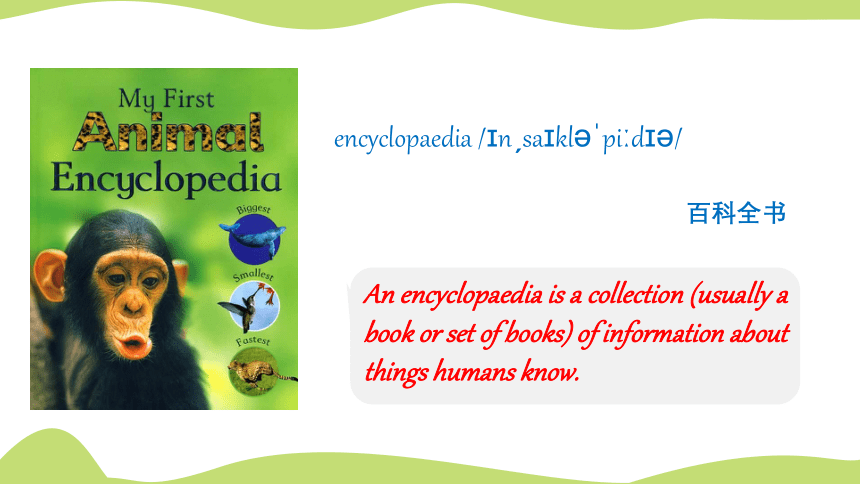
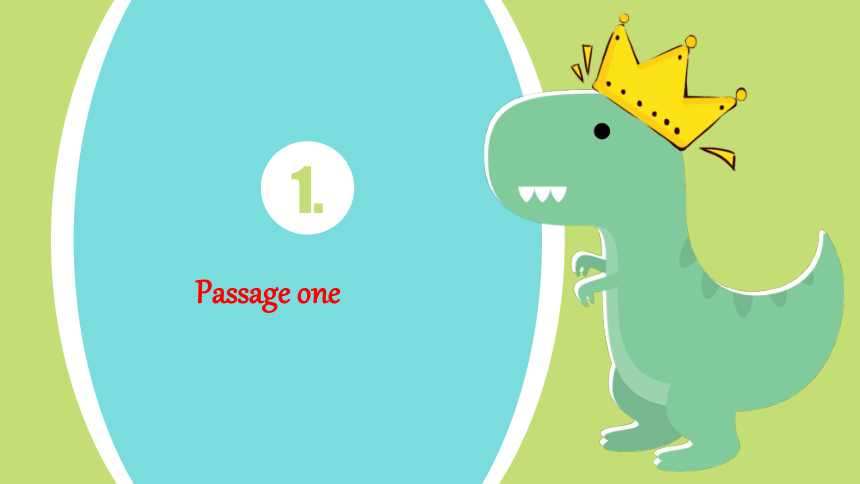
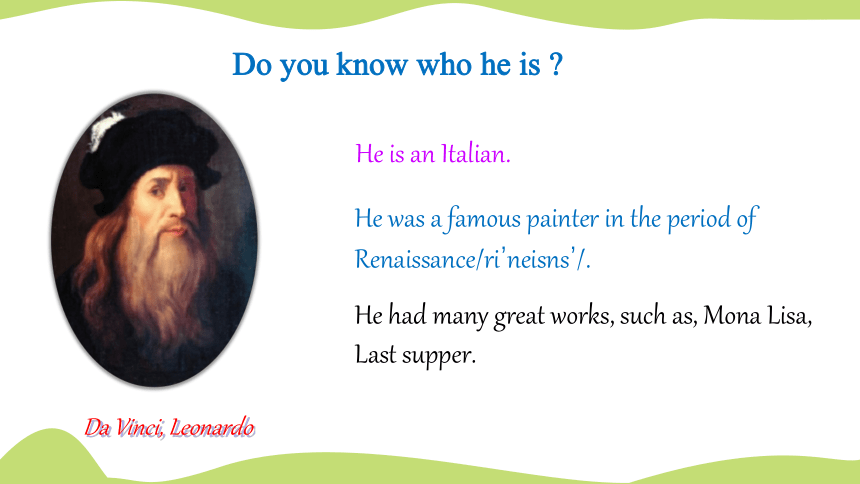

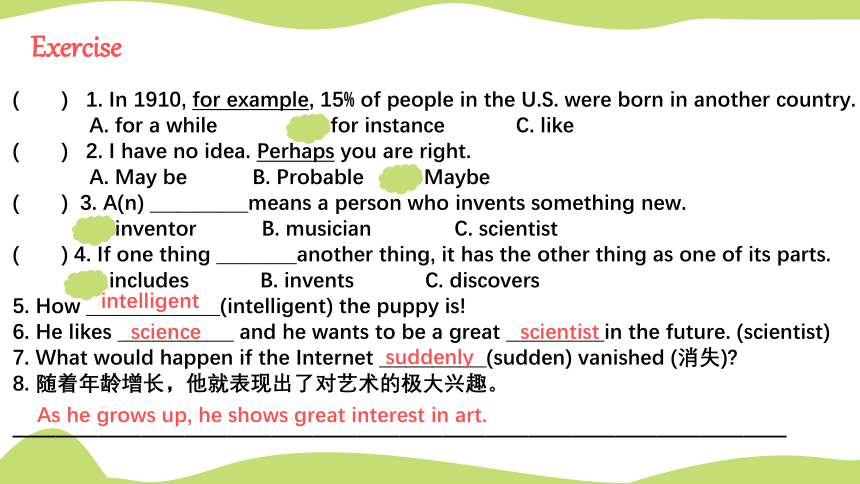
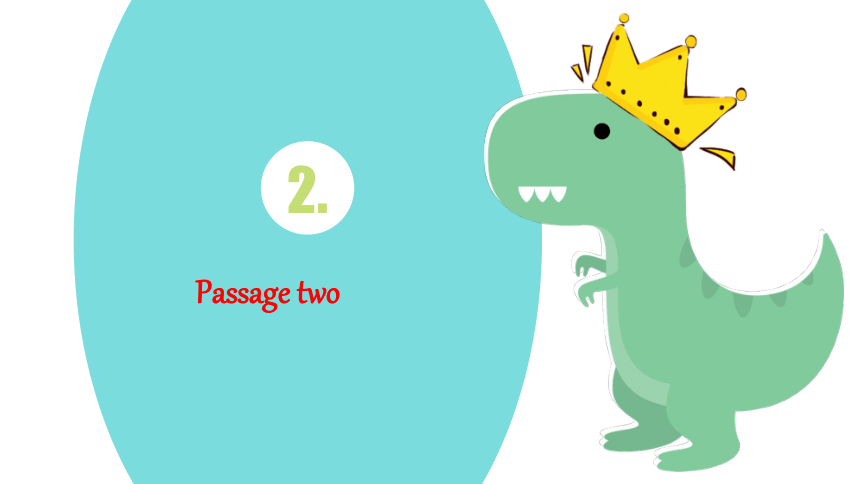
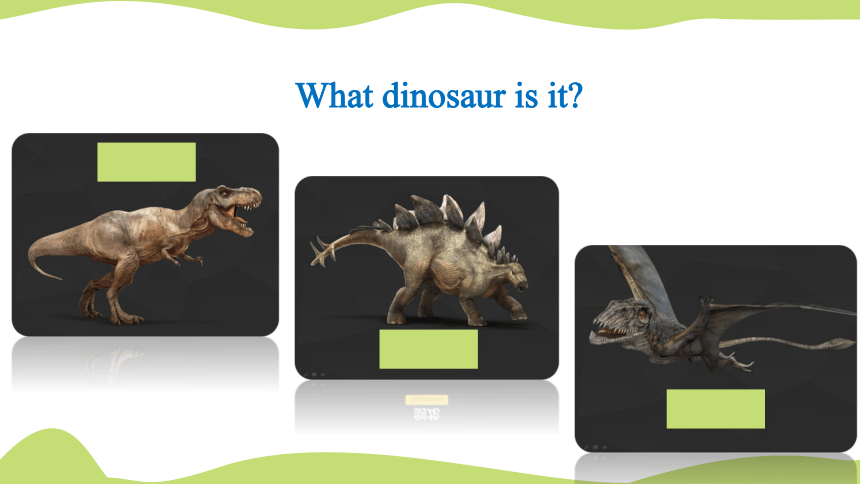

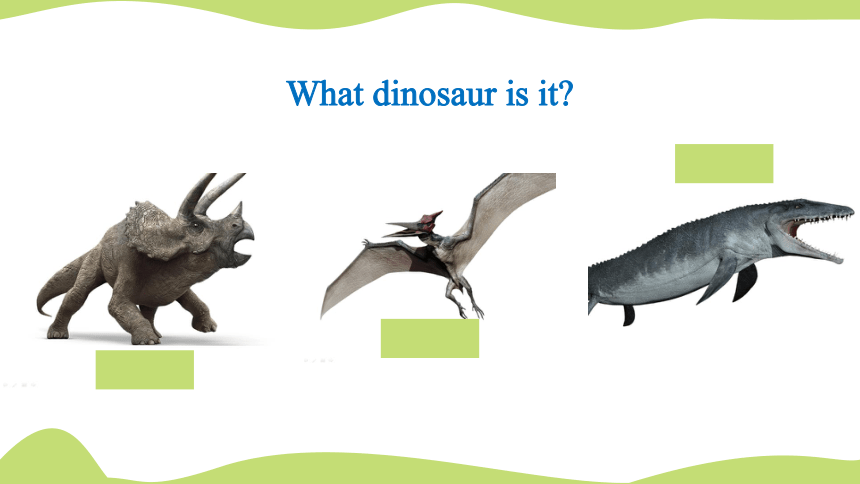


文档简介
Unit 01
Encyclopedia
书
科
百
全
encyclopaedia /?n?sa?kl??pi?d??/
百科全书
An encyclopaedia is a collection (usually a book or set of books) of information about things humans know.
1.
Passage one
Do you know who he is ?
Da Vinci, Leonardo
He is an Italian.
He was a famous painter in the period of Renaissance/ri’neisns’/.
He had many great works, such as, Mona Lisa, Last supper.
Lenardo da Vince(1452-1519) was an Italian painter, inventor, musician, engineer and scientist.
Da Vince was born in the coutryside. From an early age, he showed great intelligence and artistic ability. As he grew older, he learnt to do many different things. His paintings are very famous, and one, the Mona Lisa, is perhaps the most famous painting in the world. He also had many inventions. For example,his notebooks include some interesting drawings of flying machines.
Da Vinci, Leonardo
【adj.】意大利的
【n.] 意大利人,意大利语
【变】 Italy n.意大利
【or,er, ian, ist 表示“人”后缀】
or: actor, director,
er: teacher, player, singer 从事职业
ian: historian, politician, musician …家
ist: artist, scientist, pianist …者/家
【 v. bear n. birth 出生】
be born in+地方/月/年
be born on+日期
be born with 与生俱来
【n. 乡下】
village=far away from the city centre
【v. 展示】
show sth. to sb. 向某人展示某物
show up=appear 出现
【n. 才智,智慧】=wisdom
adj. intelligent =wise=clever=smart
【adj. 艺术的】
n. art, artist
【conj. 随着】引导时间状语从句
【v. learn-learnt 学习】
learn to do sth;
learn how to do sth;
learn sth. from sb./sth;
【adv.也许】=probably/maybe
【n.发明】invent v. Inventor n.
【v.包括,包含】=contain/consist of
区别:including/included
Exercise
( ) 1. In 1910, for example, 15% of people in the U.S. were born in another country.
A. for a while B. for instance C. like
( ) 2. I have no idea. Perhaps you are right.
A. May be B. Probable C. Maybe
( ) 3. A(n) ___________means a person who invents something new.
A. inventor B. musician C. scientist
( ) 4. If one thing _________another thing, it has the other thing as one of its parts.
A. includes B. invents C. discovers
5. How _______________(intelligent) the puppy is!
6. He likes _____________ and he wants to be a great ___________in the future. (scientist)
7. What would happen if the Internet ____________(sudden) vanished (消失)?
8. 随着年龄增长,他就表现出了对艺术的极大兴趣。
————————————————————————————————————
intelligent
science
scientist
suddenly
As he grows up, he shows great interest in art.
2.
Passage two
What dinosaur is it?
What dinosaur is it?
What dinosaur is it?
Dinosaurs lived on Earth more than 60 million years before human beings. They lived everywhere on Earth. Some dinosaurs were as small as chickens. Others were as big as ten elephants. Some could even fly.
Many dinosaurs ate plants. However, some dinosaurs liked to eat meat.
Dinosaurs lived on Earth for more than 150 million years. Then, suddenly, they all died out. Nobody knows why. However, we can learn about them from their fossils.
Dinosaurs
【超过】=over
no more than 不过是,仅仅
【人类】=human
【adv. 到处】=here and there
【some…others】一些…一些…
some…the others 一些…其它的…
【as+adj./adv.原级+as】与…一样
【adv. 然而】放在句前,用逗号隔开
区别but(conj.)
【adv. 突然】
=surprisingly and unexpectedly
adj./n. sudden 突然
【灭绝】=disappear
dead adj.
death n.
die of/from因…死亡
【了解,获悉】
=know about/get the information of sth.
Exercise
( ) 1. Cindy _____the second prize in the singing competition yesterday.
A. beat B. won C. lost
( ) 2. Can you explain why dinosaurs died out suddenly?
A. disappeared B. discovered C. invented
( ) 3. Let’s find ________the truth of the matter.
A. out B. on C. about
( ) 4. Jenny helped me _____some housework.
A. does B. do C. did
5. Liu Ying can sing as _______________(beauty) as the famous singer!
6. About two _________(billion) people watched this video last month.
7. As a students, we should learn __________(look) ______ new words in the dictionary.
8. 在操场上,一些学生在打羽毛球,一些学生在聊天。
————————————————————————————————————
beautifully
billion
to look
In the playground, some students are playing badminton, others are chatting.
up
3.
Vocabulary
Italian n.意大利人
【例】There are lots of great ________(art) in______ (Italy).
【变】Italy n.意大利
Italian adj.意大利(人)的
n.意大利人,意大利语
artists
Italy
ability n.才能,能力
【搭】have ability to do sth 有能力做某事
【例】The college students had cultivated(培养) the _________(able) to ask questions,the cornerstone of critical(批判) thinking.
【反】disability n. 无能,残疾
physical disability 身体残疾
【变】able adj. 能够的
disabled adj. 残疾的
ability
include /?n?klu?d/
v. 包括, 包含
【辨】including/included
(1)including prep.包括,放在名词之间
(2)included adj.包括在内的,常用语名词之后
【例】A lot of vegetables were bought today, ________(include) broccoli.
I am fan of storybooks, Harry Potter _________(include).
【同】contain/consist of
including
included
win v.获胜,赢
【变】winner n.获胜者
【例】Kobe is one of the most successful ______________in NBA.
(won,won)
【辨】win 赢得比赛/竞赛
beat/defeat 战胜某人/对手
winners
find out 了解(到),弄清
【搭】find out the truth 查明真相
【译】她终于找到了英语成绩总是没有提高的原因.
Finally, she ___________the reason why she had never raised her English grades.
found out
她找了很久的语法书,终于找到了!
Finally, she ___________the grammar book which she has _________ for a long time.
【辨】find out 指通过努力观察,探索等努力才查明结果
find 找到(强调结果)
look for 寻找(强调过程)
found
looked for
go for a walk=have a walk去散步
【例】After dinner, he always _______________(散步) with his mother.
used to do sth过去常常
【辨】be/get used to doing 习惯做
be used to do 被用来做
= be used for doing
goes for a walk
【例】Tim以前无聊时常抽烟,现在他已经习惯嚼口香糖。
When he was boring, Tim _______________, but now he ___________________________.
used to smoke
is used to chewing gum
look up 查阅,查询
【扩】look up 向上看
look ________环顾四周
look ________ 向外看,当心
look ________ 看不起
look ________ 寻找
look ________ 照顾
look ________ 浏览
around
out
down on
for
after
through
help sb (to) do sth帮助某人做
【搭】help sb with sth帮助某人某事
help oneself to...随便吃...
can't help doing禁不住做
【同】assist sb to do
3.
Grammar
定义:不明确指代某人或某物的代词,叫不定代词。
不定代词 Indefinite Pronouns
1. Some 与 any
some 多用于肯定句,表示“一些,几个”作形容词时,后面可以接
①不可数名词;
②可数名词
(单/复)
2) any 多用于疑问句、条件句和否定句,表示一些
some any
some通常用于肯定句
some有时用于疑问句,表委婉,期望得到对方肯定回答,如would you like some tea?
any通常用于否定及疑问句
any有时用于肯定句,表”任何一个”,起强调作用,如He forbids any talking in class.
不定代词 Indefinite Pronouns
2. few, a few, little, a little
{E8B1032C-EA38-4F05-BA0D-38AFFFC7BED3}
修饰名词
中文意思
肯/否
谓语
few
接可数名词
“很少”,
“几乎没有”
否定
复数
a few
接可数名词
“少许”、
“有一点
肯定
复数
little
接不可数名词
“很少”,
“几乎没有”
否定
单数
a little
接不可数名词
“少许”、
“有一点”
肯定
单数
不定代词 Indefinite Pronouns
3.
both, either, neither, each,
all, none
复合不定代词
some,any,no,every
-body,-thing,-one
由________________________分别加上___________________________构成的不定代词
叫复合不定代词。
{16D9F66E-5EB9-4882-86FB-DCBF35E3C3E4}复合不定代词
body
one
thing
some
somebody
someone
something
any
anybody
anyone
anything
no
nobody
no one
nothing
every
everybody
everyone
everything
复合不定代词
1、复合不定代词在句中可以作①主语、②宾语或 ③表语等。例如:
① _________ will listen to him.
没人会听他的。
② He wants ___________ to eat.
他想吃点东西。
③ Did you feel ________ different?
你没觉得什么不同?
Nobody
something
anything
复合不定代词
2、复合不定代词作主语,谓语动词要用单数。例如:
Someone ________crying in the next room.
有人在隔壁的房间哭.
There __________ nothing wrong with the TV set.
这台电视机没问题。
Everything __________ fine.
一切都很好。
is
is
is
复合不定代词
3、some-复合不定代词通常用肯定句中;any-复合不定代词多用否定句、疑问句中。
①____________ called on her last week.
上周有人拜访她。
②There isn’t _________ else there.
那里没有别人。
③Is __________ over there?
有谁在那边吗?
④If there is ___________ difficult, please tell me.
如果有什么困难,请告诉我。
Someone
anyone
anybody
anything
复合不定代词
Would?you?like?something?to?eat?
①当anything表示“任何事(物),无论何事(物)”,anyone,anybody表示“无论谁,任何人”等意义时,它们也可以用于肯定句中。如:
Anything is OK. 什么都行。
Anybody knows the answer.任何人都知道答案。
②在表示请求、建议的句子中,还用something, someone, somebody等复合不定代词。
复合不定代词
There’s ____________________ with your eyes.
你的眼睛有问题。
Did you buy______________________?
你买了什么特别的东西吗?
something wrong
5、形容词修饰不定代词时,通常放在不定代词之后。
anything special
复合不定代词
1. 常用they/them/their/he来指前面的somebody, anybody, nobody等指人的复合不定代词
2. 常用it来指前面的something, anything, nothing等指物的复合不定代词
Everyone knows this, doesn’t_______________? 人人都知道这一点,不是吗?
he/they
Nothing is difficult if you put your heart into ____________. 世上无难事,只怕有心人。
it
复合不定代词summary
复合不定代词exercise
1. I agree with most of what you said, but I don’t agree with ________.
A. everything???????????? B. anything C. something????????????D. nothing
2. --Is____ here? --No, Bob and Tim have asked for leave.
A. anybody???????????????????B. somebody C. everybody???????D. nobody
3. --One week’s time has been wasted.
--I can’t believe we did all that work for ____. A. something????? B. nothing C. everything????????????D. anything
【分析】答案选B。for nothing是习语,意为“徒劳,没有好结果”“免费”。
【分析】答案选C。由答语可知问的是“到齐了吗?”所以用everybody。
【分析】答案选A。not…everything是否定,意为“我并非同意你讲的一切”,与前一分句意思相符。而not…anything=nothing与前一分句意思矛盾。
听
谢
感
聆
THANK YOU
Encyclopedia
书
科
百
全
encyclopaedia /?n?sa?kl??pi?d??/
百科全书
An encyclopaedia is a collection (usually a book or set of books) of information about things humans know.
1.
Passage one
Do you know who he is ?
Da Vinci, Leonardo
He is an Italian.
He was a famous painter in the period of Renaissance/ri’neisns’/.
He had many great works, such as, Mona Lisa, Last supper.
Lenardo da Vince(1452-1519) was an Italian painter, inventor, musician, engineer and scientist.
Da Vince was born in the coutryside. From an early age, he showed great intelligence and artistic ability. As he grew older, he learnt to do many different things. His paintings are very famous, and one, the Mona Lisa, is perhaps the most famous painting in the world. He also had many inventions. For example,his notebooks include some interesting drawings of flying machines.
Da Vinci, Leonardo
【adj.】意大利的
【n.] 意大利人,意大利语
【变】 Italy n.意大利
【or,er, ian, ist 表示“人”后缀】
or: actor, director,
er: teacher, player, singer 从事职业
ian: historian, politician, musician …家
ist: artist, scientist, pianist …者/家
【 v. bear n. birth 出生】
be born in+地方/月/年
be born on+日期
be born with 与生俱来
【n. 乡下】
village=far away from the city centre
【v. 展示】
show sth. to sb. 向某人展示某物
show up=appear 出现
【n. 才智,智慧】=wisdom
adj. intelligent =wise=clever=smart
【adj. 艺术的】
n. art, artist
【conj. 随着】引导时间状语从句
【v. learn-learnt 学习】
learn to do sth;
learn how to do sth;
learn sth. from sb./sth;
【adv.也许】=probably/maybe
【n.发明】invent v. Inventor n.
【v.包括,包含】=contain/consist of
区别:including/included
Exercise
( ) 1. In 1910, for example, 15% of people in the U.S. were born in another country.
A. for a while B. for instance C. like
( ) 2. I have no idea. Perhaps you are right.
A. May be B. Probable C. Maybe
( ) 3. A(n) ___________means a person who invents something new.
A. inventor B. musician C. scientist
( ) 4. If one thing _________another thing, it has the other thing as one of its parts.
A. includes B. invents C. discovers
5. How _______________(intelligent) the puppy is!
6. He likes _____________ and he wants to be a great ___________in the future. (scientist)
7. What would happen if the Internet ____________(sudden) vanished (消失)?
8. 随着年龄增长,他就表现出了对艺术的极大兴趣。
————————————————————————————————————
intelligent
science
scientist
suddenly
As he grows up, he shows great interest in art.
2.
Passage two
What dinosaur is it?
What dinosaur is it?
What dinosaur is it?
Dinosaurs lived on Earth more than 60 million years before human beings. They lived everywhere on Earth. Some dinosaurs were as small as chickens. Others were as big as ten elephants. Some could even fly.
Many dinosaurs ate plants. However, some dinosaurs liked to eat meat.
Dinosaurs lived on Earth for more than 150 million years. Then, suddenly, they all died out. Nobody knows why. However, we can learn about them from their fossils.
Dinosaurs
【超过】=over
no more than 不过是,仅仅
【人类】=human
【adv. 到处】=here and there
【some…others】一些…一些…
some…the others 一些…其它的…
【as+adj./adv.原级+as】与…一样
【adv. 然而】放在句前,用逗号隔开
区别but(conj.)
【adv. 突然】
=surprisingly and unexpectedly
adj./n. sudden 突然
【灭绝】=disappear
dead adj.
death n.
die of/from因…死亡
【了解,获悉】
=know about/get the information of sth.
Exercise
( ) 1. Cindy _____the second prize in the singing competition yesterday.
A. beat B. won C. lost
( ) 2. Can you explain why dinosaurs died out suddenly?
A. disappeared B. discovered C. invented
( ) 3. Let’s find ________the truth of the matter.
A. out B. on C. about
( ) 4. Jenny helped me _____some housework.
A. does B. do C. did
5. Liu Ying can sing as _______________(beauty) as the famous singer!
6. About two _________(billion) people watched this video last month.
7. As a students, we should learn __________(look) ______ new words in the dictionary.
8. 在操场上,一些学生在打羽毛球,一些学生在聊天。
————————————————————————————————————
beautifully
billion
to look
In the playground, some students are playing badminton, others are chatting.
up
3.
Vocabulary
Italian n.意大利人
【例】There are lots of great ________(art) in______ (Italy).
【变】Italy n.意大利
Italian adj.意大利(人)的
n.意大利人,意大利语
artists
Italy
ability n.才能,能力
【搭】have ability to do sth 有能力做某事
【例】The college students had cultivated(培养) the _________(able) to ask questions,the cornerstone of critical(批判) thinking.
【反】disability n. 无能,残疾
physical disability 身体残疾
【变】able adj. 能够的
disabled adj. 残疾的
ability
include /?n?klu?d/
v. 包括, 包含
【辨】including/included
(1)including prep.包括,放在名词之间
(2)included adj.包括在内的,常用语名词之后
【例】A lot of vegetables were bought today, ________(include) broccoli.
I am fan of storybooks, Harry Potter _________(include).
【同】contain/consist of
including
included
win v.获胜,赢
【变】winner n.获胜者
【例】Kobe is one of the most successful ______________in NBA.
(won,won)
【辨】win 赢得比赛/竞赛
beat/defeat 战胜某人/对手
winners
find out 了解(到),弄清
【搭】find out the truth 查明真相
【译】她终于找到了英语成绩总是没有提高的原因.
Finally, she ___________the reason why she had never raised her English grades.
found out
她找了很久的语法书,终于找到了!
Finally, she ___________the grammar book which she has _________ for a long time.
【辨】find out 指通过努力观察,探索等努力才查明结果
find 找到(强调结果)
look for 寻找(强调过程)
found
looked for
go for a walk=have a walk去散步
【例】After dinner, he always _______________(散步) with his mother.
used to do sth过去常常
【辨】be/get used to doing 习惯做
be used to do 被用来做
= be used for doing
goes for a walk
【例】Tim以前无聊时常抽烟,现在他已经习惯嚼口香糖。
When he was boring, Tim _______________, but now he ___________________________.
used to smoke
is used to chewing gum
look up 查阅,查询
【扩】look up 向上看
look ________环顾四周
look ________ 向外看,当心
look ________ 看不起
look ________ 寻找
look ________ 照顾
look ________ 浏览
around
out
down on
for
after
through
help sb (to) do sth帮助某人做
【搭】help sb with sth帮助某人某事
help oneself to...随便吃...
can't help doing禁不住做
【同】assist sb to do
3.
Grammar
定义:不明确指代某人或某物的代词,叫不定代词。
不定代词 Indefinite Pronouns
1. Some 与 any
some 多用于肯定句,表示“一些,几个”作形容词时,后面可以接
①不可数名词;
②可数名词
(单/复)
2) any 多用于疑问句、条件句和否定句,表示一些
some any
some通常用于肯定句
some有时用于疑问句,表委婉,期望得到对方肯定回答,如would you like some tea?
any通常用于否定及疑问句
any有时用于肯定句,表”任何一个”,起强调作用,如He forbids any talking in class.
不定代词 Indefinite Pronouns
2. few, a few, little, a little
{E8B1032C-EA38-4F05-BA0D-38AFFFC7BED3}
修饰名词
中文意思
肯/否
谓语
few
接可数名词
“很少”,
“几乎没有”
否定
复数
a few
接可数名词
“少许”、
“有一点
肯定
复数
little
接不可数名词
“很少”,
“几乎没有”
否定
单数
a little
接不可数名词
“少许”、
“有一点”
肯定
单数
不定代词 Indefinite Pronouns
3.
both, either, neither, each,
all, none
复合不定代词
some,any,no,every
-body,-thing,-one
由________________________分别加上___________________________构成的不定代词
叫复合不定代词。
{16D9F66E-5EB9-4882-86FB-DCBF35E3C3E4}复合不定代词
body
one
thing
some
somebody
someone
something
any
anybody
anyone
anything
no
nobody
no one
nothing
every
everybody
everyone
everything
复合不定代词
1、复合不定代词在句中可以作①主语、②宾语或 ③表语等。例如:
① _________ will listen to him.
没人会听他的。
② He wants ___________ to eat.
他想吃点东西。
③ Did you feel ________ different?
你没觉得什么不同?
Nobody
something
anything
复合不定代词
2、复合不定代词作主语,谓语动词要用单数。例如:
Someone ________crying in the next room.
有人在隔壁的房间哭.
There __________ nothing wrong with the TV set.
这台电视机没问题。
Everything __________ fine.
一切都很好。
is
is
is
复合不定代词
3、some-复合不定代词通常用肯定句中;any-复合不定代词多用否定句、疑问句中。
①____________ called on her last week.
上周有人拜访她。
②There isn’t _________ else there.
那里没有别人。
③Is __________ over there?
有谁在那边吗?
④If there is ___________ difficult, please tell me.
如果有什么困难,请告诉我。
Someone
anyone
anybody
anything
复合不定代词
Would?you?like?something?to?eat?
①当anything表示“任何事(物),无论何事(物)”,anyone,anybody表示“无论谁,任何人”等意义时,它们也可以用于肯定句中。如:
Anything is OK. 什么都行。
Anybody knows the answer.任何人都知道答案。
②在表示请求、建议的句子中,还用something, someone, somebody等复合不定代词。
复合不定代词
There’s ____________________ with your eyes.
你的眼睛有问题。
Did you buy______________________?
你买了什么特别的东西吗?
something wrong
5、形容词修饰不定代词时,通常放在不定代词之后。
anything special
复合不定代词
1. 常用they/them/their/he来指前面的somebody, anybody, nobody等指人的复合不定代词
2. 常用it来指前面的something, anything, nothing等指物的复合不定代词
Everyone knows this, doesn’t_______________? 人人都知道这一点,不是吗?
he/they
Nothing is difficult if you put your heart into ____________. 世上无难事,只怕有心人。
it
复合不定代词summary
复合不定代词exercise
1. I agree with most of what you said, but I don’t agree with ________.
A. everything???????????? B. anything C. something????????????D. nothing
2. --Is____ here? --No, Bob and Tim have asked for leave.
A. anybody???????????????????B. somebody C. everybody???????D. nobody
3. --One week’s time has been wasted.
--I can’t believe we did all that work for ____. A. something????? B. nothing C. everything????????????D. anything
【分析】答案选B。for nothing是习语,意为“徒劳,没有好结果”“免费”。
【分析】答案选C。由答语可知问的是“到齐了吗?”所以用everybody。
【分析】答案选A。not…everything是否定,意为“我并非同意你讲的一切”,与前一分句意思相符。而not…anything=nothing与前一分句意思矛盾。
听
谢
感
聆
THANK YOU
